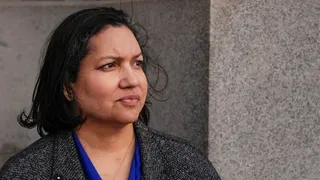August 25, 2013
Remembering Exodus International & Looking to the Future
Douglas Baulf READ TIME: 6 MIN.
It has been a summer of monumental gains and crippling setbacks for the global LGBT rights movement. The United States struck down the discriminatory Defense of Marriage Act and Proposition 8, and France and the United Kingdom both legalized gay marriage.
But halfway around the world, these gains are overshadowed by the actions of the Russian government, which enacted legislation that prohibits the "promotion" and public discussion of homosexuality -- legislation that, if violated, carries the threat of hefty prison sentences and fines.
As the writer and entertainer Stephen Fry pointed out, eerie parallels can be drawn between the current situation in Russia, and the situation in pre-Holocaust Germany, which bore witness to the gradual and systematic removal of Jewish citizens from civic life.
Despite the Supreme Court's rulings on DOMA and Prop 8, America is in an ambivalent situation regarding LGBT progress arose in June, with the breakdown of Exodus International -- a network of Christian seminaries that focused on the "conversion" of gay and questioning individuals to heterosexuality.
Prior to its closure, the network branded itself as "the oldest and largest Christian ministry dealing with faith and homosexuality." The organization was renowned for the practice of "conversion therapy," which attempts to alter an individual's sexuality to fit with the heterosexual status quo.
The practice has long been condemned by reputable psychiatric organizations, with a majority of medical professionals arguing that sexual orientation cannot be changed and California and, more recently, New Jersey have banned minors from being forced to undergo the controversial practice.
Regardless of compelling evidence to the contrary, Exodus International and similar groups widely touted the effectiveness and moral validity of their therapy sessions.
This all changed, dramatically, when the president of the organization, Alan Chambers, issued an apology to the LGBT community back in June. Chambers acknowledged the ineffectiveness of conversion therapy, and apologized for the pain his organization invariably inflicted upon its members and their families.
"I am sorry we promoted sexual orientation change efforts and reparative theories about sexual orientation that stigmatized parents," said Chambers.
His emotional statement acknowledged the extensive trauma his organization caused when he explained, "I have heard stories of shame, sexual misconduct and false hope. In every case that has been brought to my attention, there has been swift action resulting in the removal of these leaders and/or their organizations. But rarely was there an apology or a public acknowledgement by me."
Another former Exodus employee, Randy Thomas, echoed Chambers' apology. He conceded that the conduct of Exodus international was hurtful and problematic, and also claimed that the power of his position often hindered his capacity for critical thinking. But his apology stopped short of acknowledging the ineffectiveness of reparative therapy.
"I participated in the hurtful echo chamber of condemnation," he said. "I gave lip service to the gay community, but really did not exemplify compassion for them. I placed the battle over policy above my concern for real people. I sometimes valued the shoulder pats I was given by religious leaders more than Jesus' commandment to love and serve [...] In the name of trying to positively affect Christian leaders, I willingly became one of their pawns. Again, I was selfish and prideful. Please forgive me."
More significantly, in an interview from earlier this month, Chambers explained to the Huffington Post that despite a 16-year marriage to a woman, he still has an attraction to men. He also he stood by the acknowledgement that reparative therapy is inherently destructive. But despite these weighty admissions, Chambers refused to identify as gay or bisexual and instead elucidated how he tries to eschew such labels.
"I am happily married. There's not been one day in the course of our nearly 16 years of being married that I've been tempted to be unfaithful to my wife," he said. "I would say I have an orientation toward her. I do have same-sex attractions."
"Am I a gay man?" he asked "Some people would say you're gay simply because you have these attractions. Some people would say you're straight because I'm married. Some people say I'm ex-gay because I'm not leading a gay life."
Perhaps the collapse of Exodus International only appears to be a groundbreaking occurrence. It is difficult to dispute the positive impact of Chambers' and Thomas' respective apologies, but the situation certainly isn't as straightforward as it seems.
As Peter Ould, a "post-gay" critic explains, "The Exodus Board deciding to shut down Exodus International is in some sense meaningless. Ever since the Board stopped being appointed by the member ministries and instead became self-appointed, Exodus stopped being in any sense representative of those ministries it claims to represent. Instead it has increasingly become simply, for better or worse, the Alan Chambers Ministry. No accountability equals no responsibility."
"None of the Exodus Member Ministries are shutting down and they will probably find another grouping to become associated with," he said. "Those trumpeting this move as a powerful moment are rather missing the point that most of the ex-gay, post-gay and whatever-gay ministries will continue just as before. And some of those ministries, like the newly organized Restored Hope Network, will continue explicitly to promote certain modified versions of reparative therapy."
Certainly, The Restored Hope Network, established in Oklahoma by a group of former Exodus members, has pledged to continue with reparative therapy programs. A visit to the organization's new website quickly confirms this, with statements vowing to "help" people struggling with issues of gender, sexuality and faith.
Indeed, their mission statement reads: "Restored Hope is a membership governed network dedicated to restoring hope to those broken by sexual and relational sin, especially those impacted by homosexuality. We proclaim that Jesus Christ has life-changing power for all who submit to Christ as Lord; we also seek to equip His church to impart that transformation."
Another potentially problematic development pertaining to sexuality conversion is the emergence of a new "ex-gay" movement. Using a familiar framework of oppression and marginalization to promote their cause, "ex-gays" are headed by an organization known as Voices of the Voiceless, founded by activist Christopher Doyle.
Doyle claims that "tens of thousands" of "ex-gays exist," but are "in the closet because of fear, shame and threats from gay activists." Doyle's VoV organization is an offshoot group of Christian ex-gay ministry, The International Healing Foundation. They are allegedly the "only anti-defamation organization dedicated to defending the rights of former homosexuals, individuals with unwanted same-sex attractions and their families."
As the culture wars rage on, both internationally and domestically with regards to LGBT rights, the option of sexuality conversion will remain, for the time being at least, an attractive prospect for some LGBT individuals -- especially for those who are deeply religious and acutely uncomfortable with their same-sex attraction and desire.



